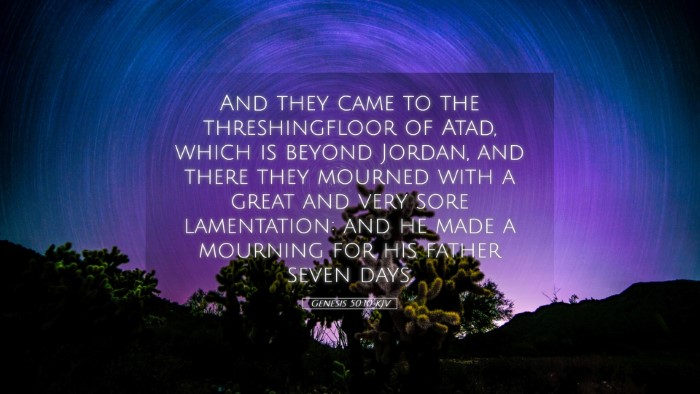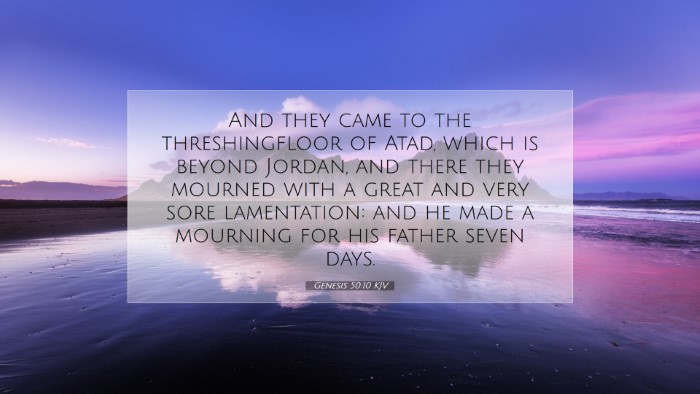Commentary on Genesis 50:10
Verse: Genesis 50:10 - "And when they came to the threshing floor of Atad, which is beyond the Jordan, they lamented there with a great and very heavy lamentation; and he made a mourning for his father seven days."
Introduction
This verse captures a poignant moment in the biblical narrative, marking the end of a significant chapter in the life of Joseph and the entire family of Israel. The emotional context of mourning and the cultural practices surrounding death provide rich theological insights.
Contextual Background
The death of Jacob, Joseph's father, represents not merely a personal loss but a turning point for the nation of Israel. The ensuing mourning signifies the respect due to a patriarch whose life was marked by both triumph and trials. The place known as the "threshing floor of Atad" serves as an important geographical and symbolic location for this lamentation.
Significance of Mourning
The act of mourning, especially within ancient Near Eastern cultures, was a profound expression of grief and respect. As noted by Matthew Henry, the mourning period was vital for processing the loss of a family member. In this case, Jacob’s death prompted a substantial public show of grief, highlighting his significance in Israel's history.
The Threshing Floor of Atad
Atad, referenced as a threshing floor, symbolizes a transitional space where grain is separated from chaff; metaphorically, it suggests the separation of life from death. Albert Barnes notes that this location, "beyond the Jordan," indicates a distance from Canaan, emphasizing the journey taken by Joseph and his brothers as they transported Jacob's body for burial.
Cultural Practices in Mourning
In line with Adam Clarke's observations, the cultural practice of mourning was extensive, involving ceremonial aspects such as loud lamentation and public grief. The seven-day mourning period reflects a biblical pattern of grief, offering a time for reflection on loss while allowing the community to share in suffering.
The Nature of the Lamentation
The description of their lament as "great and very heavy" underscores the depth of their sorrow. This phrase evokes a sense of collective grief where both Joseph and his brothers are united in their mourning, demonstrating the familial bonds and the communal nature of sorrow in Hebrew culture.
Lessons from Collective Mourning
- Unity in Grief: The shared experience of mourning serves as a reminder of the bonds that unite the family of Israel. This unity plays a crucial role in their identity and future.
- Honoring Legacy: The elaborate mourning rituals signify respect for Jacob’s legacy. Through mourning, both Joseph and his brothers recognize the significance of their father in shaping their lives and destinies.
- Time for Reflection: The period of grief also opens a space for reflection on life, legacy, and the hope of resurrection, which is a theme that resonates throughout the entirety of scripture.
Theological Implications
Beyond the immediate context, this verse contributes to overarching theological themes in Genesis. It reflects themes of death, resurrection, and the promise of God's covenant with Jacob and his descendants. Joseph’s actions in mourning can be seen as a foreshadowing of the greater sorrow that will be experienced by subsequent generations of Israel.
God's Faithfulness
This moment of grief also reaffirms God's faithfulness to His promises. The covenant made with Jacob was not extinguished with his death; rather, it continues through his descendants. As they mourn, they are reminded of the enduring nature of God's promises.
Conclusion
Genesis 50:10 encapsulates a crucial moment in the history of Israel, laden with emotional and theological depth. From the cultural significance of mourning practices to the implications of Jacob's legacy and God's covenant, this verse encourages an understanding of the intricate relationships between family, community, grief, and divine faithfulness.
As pastors, students, theologians, and biblical scholars delve into this text, it serves as a reminder of the weight of loss and the hope that exists as part of the biblical narrative. The mourning of Jacob not only reflects personal sorrow but invites deeper contemplation of life, death, and resurrection within the Christian faith.


